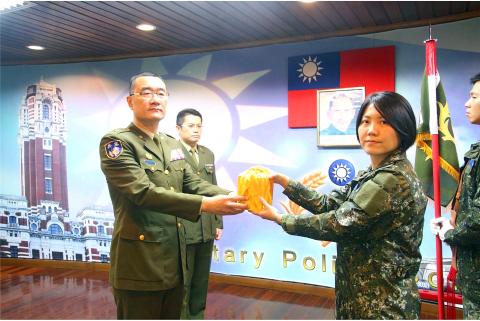A Taipei-based military police motorcycle platoon yesterday assumed a new mission when it became operational as a rapid reaction force for the Taipei garrison zone, tasked with defending the capital against attacks by enemy air assault, parachute, special operations and conventional forces.
Known as the 202nd Military Police Command’s Services and Guards Platoon before its transformation, the Quick Reaction Company — also known as the “motorcycle platoon” — was selected to bolster the Taipei garrison zone’s defense, a national security official said, speaking on condition of anonymity.
The company was last week formally established in a ceremony at the 202nd Military Police Command Headquarters in Taipei. The company commander is a female officer surnamed Chang (張).

Photo courtesy of Military Police Command
The motorcycle-equipped platoon’s high mobility was a major factor in its selection for the task, the official said.
The military police establishing the Quick Reaction Company might be a response to Chinese military drills simulating invasions of the nation’s capital, which have become frequent over the past few years.
Some of the exercises were reported to have simulated attacks by saboteurs and special operations units on recreations of the Presidential Office Building in Taipei and other buildings in the city’s government district.
The company is to be equipped with CM-32 armored infantry vehicles and other specialist gear, in addition to its motorcycles, to combat opposing paratroopers, helicopter-borne forces and special operations units, the official said.
It is to receive improved communications gear and has been given high priority in new soldier allocation to speed up its reorganization into a company, the official said.
The Military Police Command said mobility is key to countering threats against the capital and the company could utilize their motorcycles’ speed and their rapid engagement capabilities to control the city’s strategic positions and major roads.
The military police’s motorcycle unit has been reorganized several times since its creation, the command said.
The Service and Guards Platoon, the company’s previous iteration, was tasked with administrative, maintenance and transportation missions, in addition to acting as ceremonial guard at major state functions, the command said.

‘ABUSE OF POWER’: Lee Chun-yi allegedly used a Control Yuan vehicle to transport his dog to a pet grooming salon and take his wife to restaurants, media reports said Control Yuan Secretary-General Lee Chun-yi (李俊俋) resigned on Sunday night, admitting that he had misused a government vehicle, as reported by the media. Control Yuan Vice President Lee Hung-chun (李鴻鈞) yesterday apologized to the public over the issue. The watchdog body would follow up on similar accusations made by the Chinese Nationalist Party (KMT) and would investigate the alleged misuse of government vehicles by three other Control Yuan members: Su Li-chiung (蘇麗瓊), Lin Yu-jung (林郁容) and Wang Jung-chang (王榮璋), Lee Hung-chun said. Lee Chun-yi in a statement apologized for using a Control Yuan vehicle to transport his dog to a

INDO-PACIFIC REGION: Royal Navy ships exercise the right of freedom of navigation, including in the Taiwan Strait and South China Sea, the UK’s Tony Radakin told a summit Freedom of navigation in the Indo-Pacific region is as important as it is in the English Channel, British Chief of the Defence Staff Admiral Tony Radakin said at a summit in Singapore on Saturday. The remark came as the British Royal Navy’s flagship aircraft carrier, the HMS Prince of Wales, is on an eight-month deployment to the Indo-Pacific region as head of an international carrier strike group. “Upholding the UN Convention on the Law of the Sea, and with it, the principles of the freedom of navigation, in this part of the world matters to us just as it matters in the

The High Court yesterday found a New Taipei City woman guilty of charges related to helping Beijing secure surrender agreements from military service members. Lee Huei-hsin (李慧馨) was sentenced to six years and eight months in prison for breaching the National Security Act (國家安全法), making illegal compacts with government employees and bribery, the court said. The verdict is final. Lee, the manager of a temple in the city’s Lujhou District (蘆洲), was accused of arranging for eight service members to make surrender pledges to the Chinese People’s Liberation Army in exchange for money, the court said. The pledges, which required them to provide identification

BEIJING’S ‘PAWN’: ‘We, as Chinese, should never forget our roots, history, culture,’ Want Want Holdings general manager Tsai Wang-ting said at a summit in China The Mainland Affairs Council (MAC) yesterday condemned Want Want China Times Media Group (旺旺中時媒體集團) for making comments at the Cross-Strait Chinese Culture Summit that it said have damaged Taiwan’s sovereignty, adding that it would investigate if the group had colluded with China in the matter and contravened cross-strait regulations. The council issued a statement after Want Want Holdings (旺旺集團有限公司) general manager Tsai Wang-ting (蔡旺庭), the third son of the group’s founder, Tsai Eng-meng (蔡衍明), said at the summit last week that the group originated in “Chinese Taiwan,” and has developed and prospered in “the motherland.” “We, as Chinese, should never